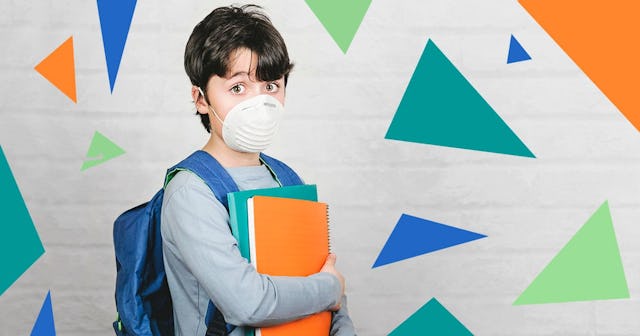We're Fooling Ourselves If We Think In-Person School Will Be The Secret To Our Kids' Mental Health And Wellbeing

We hear it in every debate about school re-openings. We see it in comment sections where parents discuss the will-we-or-won’t-we impossible decision of whether to choose remote learning this fall. And we say it ourselves. Our kids need to be back in school for their mental health and wellbeing.
But here’s the thing: Like M. Jacob boldly wrote, parents are being lied to.
No. Scratch that.
We’re lying to ourselves.
While it is undoubtedly true that our kids’ mental health – and parents’ too, for that matter – is suffering during the pandemic, returning to in-person school is not going to be the magic pill to fix that.
There is absolutely ZERO doubt that if we could do school this fall like the school we know and love, our kids would be better off in all respects. But we can’t. It is just not possible.
For the sake of argument, let’s just say we pretended that there was no pandemic (you know, kinda like the president is doing). Kids would go back to school, playing and cavorting like usual, spreading their little germs everywhere, and kids and teachers would get sick in a hot minute. There would be endless quarantines and death and lots and lots of really sick people. This is NOT an option. Just look at what’s happening in Georgia right now.
Which leaves the other option for in-person. The one recommended by public health experts. Social distancing. Universal masks. No group work. No busy lunch breaks in noisy cafeterias. No socializing in the hallways. No hugs from kindergarten teachers. In other words, a completely different school experience that any of us are used to, and it’s not going to be that magic ticket to our kids’ happiness that we’re all hoping for.
As psychologist Maggie Mulqueen wrote for NBC News, “School has never been just about the curriculum. It’s also about students’ health and development… But keeping students physically safe does not guarantee students’ psychological well-being.”
Kids are desperate to return to school and some semblance of normalcy. We all are. But in-person schooling will be the opposite of what they know as “normal school.” Sure, kids are resilient and would eventually adjust to the masks and physical distance from their peers and lack of physical affection and camaraderie, but after 5-6 months in their little cocoon at home, is this really the school environment we want to shove them into? Just because they could eventually adjust, should they?
miodrag ignjatovic/Getty
“After spending the past six months restricted to a small group of people, entering or reentering a school with perhaps hundreds of people in masks, plexiglass partitions and one-way signage is going to feel uncomfortable at best,” Mulqueen writes. “Adults and children alike comment on watching movies and feeling viscerally nervous at seeing people in large crowds.”
Mulqueen also points out that what we would be asking of kids – for little kids not to hug, for teens to not participate in group work or extracurriculars – is unnatural and potentially more unsettling for their mental health and wellbeing than continuing to learn remotely for a few more months.
And for some kids, particularly those with anxiety disorders or previous trauma, those safety measures could actually be harmful to their mental wellbeing.
All of this assumes the “best case scenario” – i.e. no one gets seriously ill or dies. What about the trauma that would be caused if a friend, family member, or teacher gets seriously ill or dies? It’s horrifying to even think about. And what about the guilt they might feel if they infect someone else – or several people – at school?
Of course, remote learning is also detrimental to kids’ mental health and wellbeing. Kids are lonely, sad, and anxious – in varying degrees.
“The limitations of remote learning are well documented, and keeping children and teenagers cooped up is also potentially damaging,” Mulqueen admits. “And of course, many parents are desperate for the child care and space schools provide. But those benefits are sadly not available to us now, much as we wish they were.”
Kids need socialization and peer interactions for their mental health and wellbeing, but to think that those will be provided in ways they need is naïve, overly optimistic, and narrow-sighted.
A young child’s social skills might be far better served by interacting with a few cousins or close friends who are also limiting outside contacts than looking at masked faces all day without any physical interactions. A teen might get more benefits from going for masked bike rides in the afternoon with two close friends than sitting in a classroom with their random acquaintances for seven hours a day. There are ways we can reap the benefits of socialization and promote their mental health and wellbeing, while also protecting the safety of the entire community.
Let me be very clear: There are no good options right now. NONE. We will all need to look at the risks and the benefits, and make a decision guided by science and data and a concern for the common good. But as we make those decisions, let’s stop using “mental health and wellbeing” like a free ticket that will give us the answer we’re all looking for – which is basically an end to this nightmare that we’re living in.
This article was originally published on